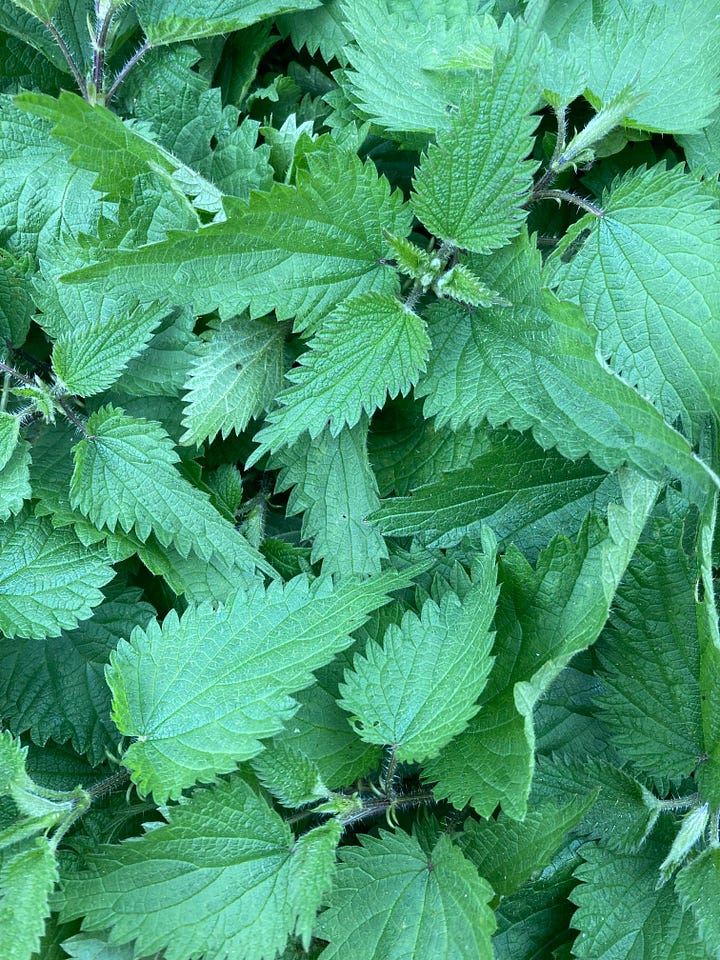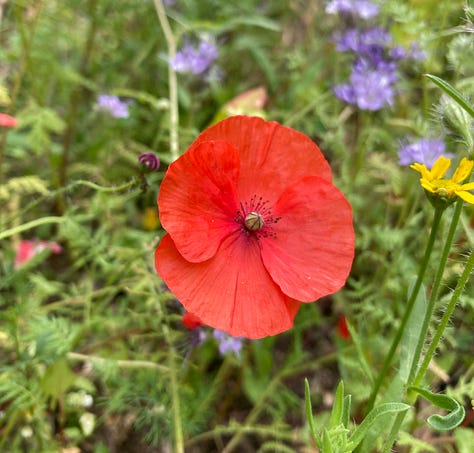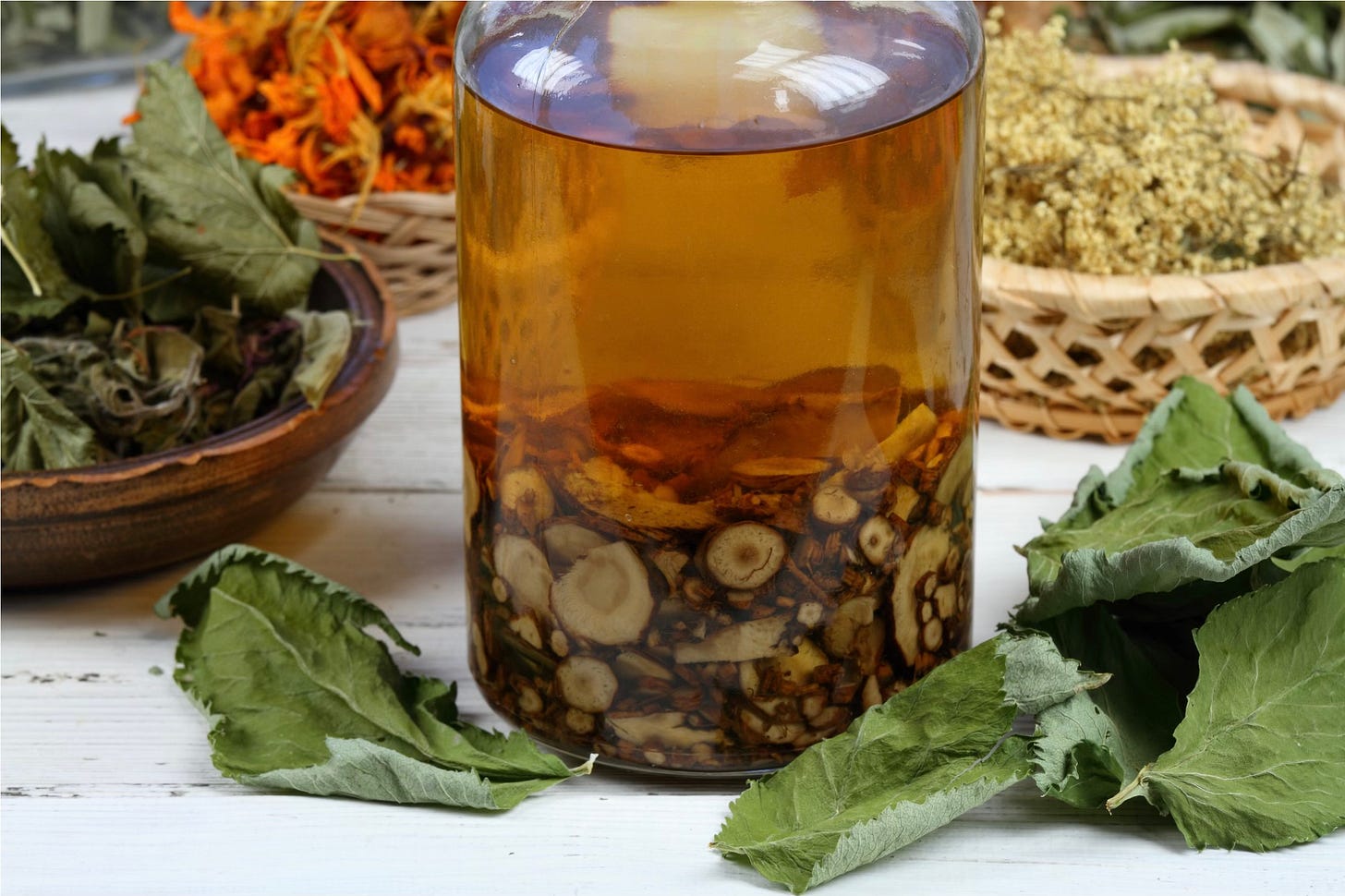How to make highly potent herbal vinegars
an herbalist’s secret to preparing the most effective medicinal vinegars
Hi! This is Marie from Naturally Yours, a newsletter for people seeking simple natural paths to holistic health and emotional balance. Thank you for being here!
Here are the posts subscribers received recently:
Five medicinal plants you didn’t know you had in your kitchen - and how to use them to treat a cold
What can Bach flower remedies do for you? – and how to use them
How to harvest medicinal roots – a step-by-step guide
If you want to make sure you won’t miss my next articles, I invite you to subscribe below!
If you enjoy this article, please let me know by tapping the 💚 button or by sharing it with a friend! Thank you!
Medicinal vinegars, you say?
Vinegar is one of the oldest solvents used in herbalism. We infuse medicinal plants in it to extract their therapeutic properties and create powerful herbal remedies.
It forms the base of several famous preparations, some of which have brilliantly stood the test of time.
This is the case, to name just one, with the famous 'Four Thieves Vinegar,' whose recipe dates back to the Middle Ages. Employed at the time as protection against the plague (nothing less!), it is now considered a panacea offering countless benefits.
Today, medicinal vinegars seem somewhat forgotten in Europe. But in other parts of the world, such as Canada, they have retained their prestige and still hold a very important place in the world of herbalism.
So much so that the Herbothèque – a world-renowned school of herbalism that unfortunately closed its doors in 2023 after 30 years of activity – considered vinegar its solvent of choice for preparing liquid extracts, preferring it to alcohol.
Don't doubt it, vinegar will enable you to prepare highly effective herbal remedies… provided you choose the right type of vinegar and work with plants that are suited to it!
And that's precisely the topic we'll dive into today!
When to work with vinegar?
Compared to tinctures, which are made with alcohol, medicinal vinegars have a great advantage: they can be given to very young children, the elderly, those who suffer or have suffered from alcoholism, people with conditions that prevent them from consuming alcohol, as well as those who simply dislike it.
If you or some of your loved ones fall into one of these categories, you have an excellent reason to choose vinegar.
Moreover, vinegar is particularly effective for extracting certain types of compounds! It is therefore a good idea to prioritize it when working with plants that contain them.
Nourishing and remineralizing plants
Vinegar is a fantastic solvent for plants that are rich in nutrients and minerals.
Not only is it remarkable at extracting minerals, sugars, and certain vitamins, but it also provides them to us in a form that is easily assimilable by our body. And if you use apple cider vinegar, it even constitutes, in itself, an additional source of minerals.
You can prepare excellent remineralizing vinegars, for example, with:
Nettle leaves (Urtica dioica or U. urens)
Horsetail aerial parts (Equisetum arvense)
Oats (Avena sativa) – the dry aerial parts. Or, even better, if you want to enjoy its nerving tonic properties as well, the fresh fruits harvested at the exact moment when they are milky. In any case, not the flakes you can find in stores for breakfast
Alfalfa aerial parts (Medicago sativa)
Chickweed aerial parts (Stellaria media)
Red clover aerial parts (Trifolium pratense)
Raspberry leaves (Rubus idaeus).
These preparations will be extremely beneficial for your overall health. They will be invaluable for supporting your nervous system during periods of fatigue or stress. And they will strengthen your musculoskeletal system (you will think of them, for instance, in the case of a fracture and to prevent osteoporosis).


Plants rich in alkaloids
Vinegar is very effective when it comes to extracting alkaloids.
You can therefore turn to it when you work with plants that contain them, such as:
Fumitory (Fumaria officinalis), whose aerial parts are used to stimulate the functions of the liver and promote detoxification
Motherwort (Leonurus cardiaca), whose aerial parts calm anxiety accompanied by heart palpitations
California poppy (Eschscholzia californica), whose aerial parts are used in case of sleep disorders
Poppy (Papaver rhoeas), whose petals calm dry and spasmodic coughs.
Note that the plants mentioned here are safe as long as the recommended dosages are respected. But alkaloid-rich plants are generally powerful, and many also have a certain level of toxicity. This is something I invite you to keep in mind and be cautious about.



Bitter plants and plants rich in tannins
Finally, vinegar is an interesting solvent for bitter plants, which you can commonly use to stimulate liver functions and improve digestion.
Among them are:
Dandelion roots (Taraxacum officinale)
Elecampane roots (Inula helenium)
Blessed thistle flowering tops (Cnicus benedictus)
Gentian roots (Gentiana lutea).
And it can be a good choice for plants rich in tannins, which tighten tissues and, as a result, have a local anti-inflammatory, antiseptic and hemostatic effect (they help reduce or stop bleeding). You can then apply the vinegar to your skin or take it internally to treat your digestive mucous membrane.
Here are some examples of such plants:
Raspberry (Rubus idaeus) or blackberry (Rubus spp) leaves
Witch hazel leaves or bark (Hamamelis virginiana)
Hazel leaves (Corylus avellana)
Plantain leaves (Plantago lanceolata or P. major).
Please, note that the information given in this article is not a substitute for medical advice. Before taking medicinal plants, always exercise caution and ensure there are no counterindications applying to you, and no risk of interaction with your medical treatment if you have one. In case of doubt, ask your doctor’s approval.
Which vinegar to use?
To achieve a potent preparation, choosing the right type of vinegar is absolutely crucial!
I recommend using organic apple cider vinegar, preferably unpasteurized, as heat would destroy the beneficial enzymes and microorganisms it contains. But rice vinegar and vinegar made from small fruits (such as blackcurrants or raspberries) are also suitable.
Then, and this is very important, you need to use vinegar with 7 or 8% acetic acid.
Why? Because 4 or 5% acetic acid vinegar is not a very effective solvent compared to what alcohol can offer.
You can use it to prepare delicious flavored vinegars that will be very pleasant for culinary use (imagine oregano, thyme or rosemary vinaigrettes!). You can also try to compensate by taking larger doses than you would with tinctures (at least doubling them).
But, generally speaking, for medicinal use, such preparations will lack potency.
Vinegar with 8% acetic acid will allow for a much better extraction! Plus, you will obtain a more stable product with a longer shelf life – and if you're already used to making medicinal vinegars with 4% vinegar and are happy with the results, I guarantee you'll be amazed by the preparations you'll get with the 8% vinegar!
So, where can you get it? That's where it gets tricky!
In many countries, the only 8% vinegar available is the white vinegar sold in the cleaning products aisle. But it is not intended for consumption and is not suitable for our preparations.
What to do in that case? No worries, there is a solution!
The secret
Here’s the secret, a little-known but very simple trick to turn 4% apple cider vinegar, which you can buy at your health store, into 8% vinegar!
With this technique, you'll be able to craft powerful and truly effective herbal remedies. This is the method I use for absolutely all the medicinal vinegars I make, including, of course, the ones I prepare for my clients and sell at the markets.
Here's how it works.




